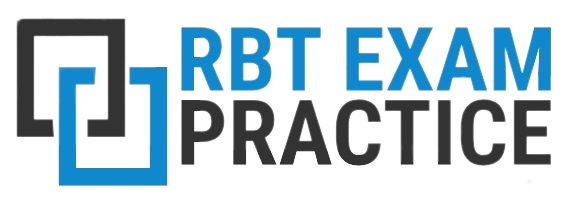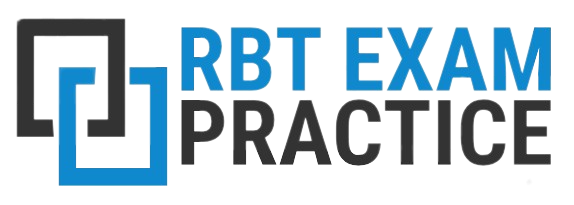Online examinations are rapidly replacing offline modes. After all, there are several benefits to this—whether you are preparing for an RBT exam or any other test, online resources are affordable, up-to-date and easily accessible.
Those who routinely practice and revise their study material are able to answer complex, real-life questions within the given time frame and ace the exam.
But we need the right study approach to succeed. This is why we have created the ultimate step-by-step study guide to help you get closer to your dream job!
Contents
Step 1: First, Find Out the Exam Format and Requirements
The RBT exam is 90 minutes long, conducted online, and includes multiple-choice questions. It’s scored on a pass/fail basis and is proctored by a supervisor. If you pass the exam, you will be qualified to practice as an RBT technician.
The RBT examination conducted by the Behavioral Analyst Certification Board (BACB) is not a regular exam. Almost every question is practical and application-based!
The BACB requirements of eligibility are very simple and include the following:
- The candidate must be at least 18 years old
- The candidate must have a high school diploma
- They must pass 40 hours of training under a licensed Behavior Analyst.
When taking the exam, the student should be aware of and will be judged on the basis of the following topics:
- Measurement
- Assessment
- Skill Acquisition
- Behavior Reduction
- Documentation and Reporting
- Professional Conduct and Scope of Practice
Step 2: Gather Online Study Resources
Some of the top sources that need mentioning have the support system of RBT exam candidates include:
- Websites:
- BACB (Behavior Analyst Certification Board)
- Autism Partnership Foundation
- Association for Behavior Analysis International (ABAI)
- Free and Paid Online Courses:
- Autism Partnership Foundation (free RBT course)
- Institute for Applied Behavioral Analysis (paid courses)
- Verbal Behavior Institute (paid courses)
- RBT Exam Practice Test (free and paid QnA Series)
- YouTube Channels:
- How to ABA
- Behavior Analyst Supervisor
- Institute for Applied Behavioral Analysis
- Practice Exam Packages:
- Behavior Development Solutions
- ABA Wizard
- Behavior Analyst Certification Board (BACB)
- Seminars and Webinars:
- CentralReach Institute
- Institute for Applied Behavioral Analysis
- Behavior Development Solutions
- Mobile Apps:
- RBT Exam Prep by ABA Wizard
- RBT Exam Prep Flashcards
- BCBA and RBT Exam Prep by Pocket Prep
Topics outside of your syllabus you should focus on the most include:
- Current affairs and updates related to ASD, ADHD, other neurodevelopmental disorders, DSM 5, ICD 11, latest research papers, etc
- Practical depictions of skill acquisition training through role play
- Memory-enhancing tools like mnemonics and flashcards
- Full-length practice papers, as well as general online quizzes
Additionally, online preparation keeps students connected with their peers and the latest news and updates about the exam.
Step 3: Create a Study Plan
Set up a structured study schedule in order to give the best performance:
- Make sure the schedule is tailored to your personal habits – there is no right or wrong way to study
- Give tests and quizzes regularly to increase your confidence
- Highlight areas that seem difficult and get back to them again
- Set realistic goals and milestones, rewarding yourself whenever you meet them in time
- Balance your studies with all other commitments
- Keep a buffer period during which you can cover up if you lag behind
Step 4: Engage in Active Learning
The RBT online exam is structured in such a way that those who have the clearest concept are most likely to pass. Active learning will help you pinpoint your doubts and rectify them. You can learn actively by:
- Participating in online study groups and forums
- Attending virtual study sessions and webinars
- Requesting tutoring whenever you need it
- Using interactive tools and apps for active engagement
Step 5: Take Practice Exams
In the above section, we have provided free and paid practice exams that simulate the actual online environment. Take these exams regularly to know your level.
Next, analyzing practice test results is just as important as sharpening your knowledge and soft skills, which will improve your performance.
Step 6: Review and Revise
Ideally, you must complete your syllabus at least a month before the exam so that you can focus on revision and review.
Look into the notes you have made till now and the difficult questions you highlighted while practicing the tests. Spend more time on the difficult topics, but don’t neglect any important section.
You will find several online resources for revision as well!
Step 7: Prepare for Exam Day
For a successful online experience, choose a quiet place with a good Wi-Fi connection and no interruptions. Follow ethical guidelines to avoid disqualification. If you have any technical problems, contact the supervisor immediately try to log out and log back in on the exam portal.
To stay calm and reduce stress, take deep breaths, focus on one question, maintain positive thoughts, and take short breaks.
Conclusion
Acing the RBT exam isn’t just about knowing your stuff – candidates need to hone time management skills, stress regulation and analytical thinking as well. We need to make sure we are confident no matter how difficult the paper appears. Effectively utilizing different success hacks like practice papers, mnemonics, and online visual learning can help you reach a depth of understanding that will impress your examiner!


